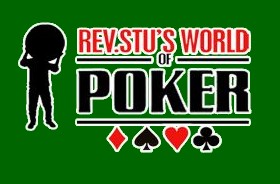|
LIKE A
VIRGIN
Fold! (Always believe in your soul.)
One of the oddest phenomena of recent years is the worldwide explosion of poker. For no immediately apparent reason, suddenly everyone's playing it. Switch on satellite TV after 9pm and you'll find literally dozens of channels showing poker matches. A pub near you probably has a regular tournament league going. WH Smith bulges with magazines devoted to the subject. Yet not so very long ago, it was all rather different.
A couple of years back,
your reporter went out looking to buy a nice set of casino-style
chips for home games. (Having, on the previous occasion I'd arranged
one, ended up buying loads of those little pebbles made of coloured
glass that they sell in candle shops for purposes nobody's quite sure about.) It turned out to be near-impossible to find any such things unless you went to actual casino suppliers, where a basic set of 500 decent-quality chips in a nice case went for around £200, with another 30 quid in postage on top of that (since good poker chips,
like my Uzi, weigh a ton).
Eventually I tracked some down, via eBay, at a place called - of all things - Golf HQ, heavily reduced in a sale to a bargain £50 including shipping. Nowadays, of course, you can't walk into a Poundstretcher without finding entire shelves groaning with half-decent poker sets, and I can't go a day without getting an email from Golf HQ offering me various golf clubs for 1p if I buy anything at all from their site. Like I said - odd.
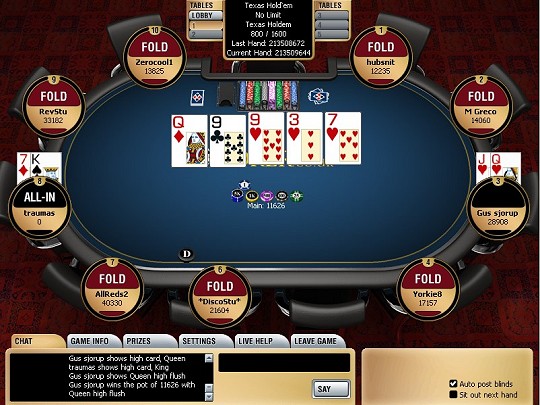
Gus sjorup just "flushed" the "river", if you're joining us late.
The obvious catalyst for this is the growth in online poker, which has sprung into massive commercial life with the advent of widespread broadband, although the theory doesn't stand up to a vast amount of logical scrutiny. Online poker - all online gambling, really - is something still viewed with a great deal of suspicion by most people, and hardcore poker players regard it an extremely poor substitute for live games. Even professionals will tell you that poker is a game that's 70% luck, so most of the edge for good players comes in seeing people in the flesh, trying to judge their reactions and study their styles in order to gain the crucial advantage of that other 30%. Online is fine for practice, or making cash by fleecing chumps, but real-life games are where it's at, and you don't need broadband for those.
Around the end of 2005, then, your correspondent (after trying unsuccessfully for some time to organise some home games around the complicated social schedules of various friends) happened to be wandering past a pub a couple of hundred yards from his house, and noticed a sign in the window advertising a poker league. There was a website address at the bottom, and fortunately 200 yards is just within the distance range across which this old man's brain can retain new information, so when I got home I typed the URL into Firefox, seconds before it disappeared from memory along with where I put the scissors, the PIN number for my Sky digibox and what I went into the kitchen for.
Browsing the site, it all sounded too good to be true. This conveniently-nearby and rather pleasant local student pub ran a monthly league, with games every Tuesday and Friday night. Entry was free, you got a present just for joining (a really nice pack of proper casino cards, as it transpired), and there were pretty tasty prizes for each month's winners (eg a laptop, £500 cash, a trip to Vegas). Even the drinks were cheap. It had to be worth a go.
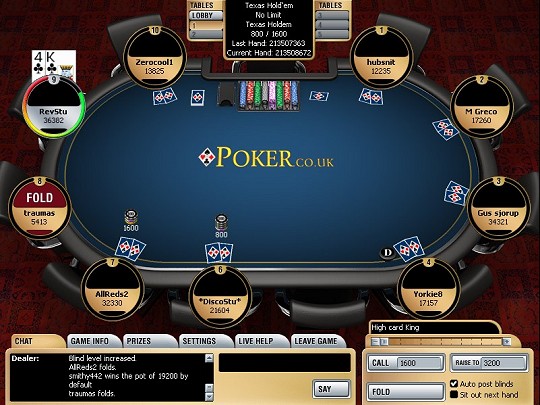
That's Beppe from EastEnders at top right. No, really.
So the next Tuesday, I braved the chill of the winter evening and found myself in the pub's large cellar bar (normally used for showing sporting events on the big-screen TV), which was very marginally warmer than outside. (Having, as is common with cellars, no integral heating, with only a couple of inadequate fan heaters struggling to stave off the onset of hypothermia long enough to get the packs shuffled). Still, as the place filled up with about three dozen bodies (mostly male ones), the temperature rose enough for some brave souls to take their coats off, and everyone drew a table and sat down.
If you've ever wondered how tournament poker works, and how you can play it in ordinary pubs that don't have casino licences, it goes like this. No money is staked, either as an entry fee or on the poker hands. Everyone (the maximum number of players is 42 per game in this particular
league) gets a set amount of chips at the start, and the whole thing is played as a battle royal across several individual tables until only one player is left.
Depending on when you get knocked out, you're awarded points (here, the top 16 players all score something), and at the end of the month the players with the highest aggregate score go into a final (the number of finalists varies depending on the venue, but is usually between 50 and 70) and play for whatever that month's prizes are (the top eight or so places usually win something). Since it doesn't cost anything to play, nobody's quite sure where the money for all the prizes comes from, and nobody asks.
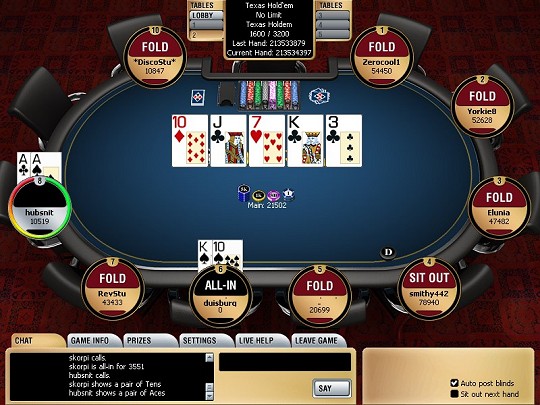
Against all the odds, duisburg pinches one against pocket Aces by drawing two pairs.
So anyway. The game started with the minimum of ceremony, but your reporter's tournament-virgin fears were quickly allayed, with everyone at the table being extremely newbie-friendly and happy to help novice players learn the intricacies of burn cards, side pots and which seats you're allowed to sit in when you move to a new table. (Pro tip: you can't join a game as small blind or dealer, for complex technical reasons, but everyone will be more than happy if you want to come in at the big-blind seat.) The next four hours flew by,
before finally going out to two pairs of Kings and Queens, waiting in vain for a flush draw, but in a pretty creditable 13th place and just squeezing into the points.
Suitably hooked, it was a long wait over the Christmas/New Year break for the next game, but come the second week of January everyone was back in the freezing basement, all wearing extra layers, and your correspondent's game came on in leaps and bounds, with the final placing improving to 11th, 10th, 6th, 6th, 4th and then, one unforgettable Friday, 1st. Arriving at the final table with the fewest chips (about 6,000 to the leader's 25,000), a mix of good cards and bold calling turned the game around in about 10 action-packed minutes, and your newly-hardcore
pokermeister walked away with the victor's Prize T-Shirt Of Honour.
The rest of the month narrowly failed to garner enough points to get into the final, sparking off a run of terrible luck that's only just been arrested at the time of writing this feature. Though there's a considerable margin of skill involved too, poker is inescapably at its heart a game of chance. If you're the best player in the world and you've got 2-7 offsuit, you're still probably going to lose if the complete novice opposite has a pair of Kings.
If you're going to play poker, you have to accept that there'll be nights when you sit there doing nothing except folding, folding and folding again. And while the social aspect still makes it a good night out, if you're on a run of several nights of completely crappy cards you find yourself itching for a hand you can actually play, and in those circumstances two games a week sometimes just isn't enough. And that's when you start to think about braving the world of anonymous strangers and - ulp - going online.
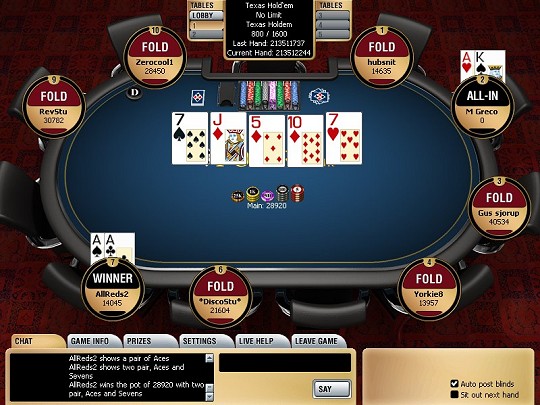
Beppe
comes a cropper clinging to a big slick against pocket rockets. (Pardon? - Ed)
But don't panic. Playing poker online isn't necessarily the first step on the slippery slope to Gamblers Anonymous. For a start, there are quite a few "freeroll" games around. Freeroll
games are those where - just like the live tournaments we've been
describing - there's no entry fee and no cash stakes, but where some
mysterious magical power nevertheless provides prizes for the
winners. Most poker sites run at least one freeroll a day - obviously, competition is fierce at most of them, and if they're US-based you might have to play at some odd hours, but they'll feed your craving for action without risking you ending up selling your kidneys for stake money.
Sooner or later, though - and especially if they have a little taste of success somewhere along the way - anyone who knows the difference between a straight flush and a full house will find themselves at least once entertaining the fantasy of becoming one of that strange, unearthly breed - the professional poker player. Making your living with the Ace of Spades is a glamorous and seductive dream, even if for many pro players the reality is sitting around in their pants blearily staring at a PC monitor at 8am in an attempt to relieve Dwayne Twat from Numbnuts, Ohio of his Budweiser-fuelled $20 stake. (Online cash players recommend playing early in the morning UK time, in the hope that a large percentage of their US opponents will be drunk rednecks having a rash late-night gamble.)
But if you want to walk in that world, you're almost certainly going to have to start playing in pay games (unless you get VERY lucky and manage to build yourself a bankroll just from winning in freebies). And so it came to be that in a moment of boredom yesterday afternoon your reporter - for you, the ever-inquiring readers of
RSWoP - gathered his wits, his nerve and his Visa card, and slapped his virtual electro-money down on. Here's what happened.
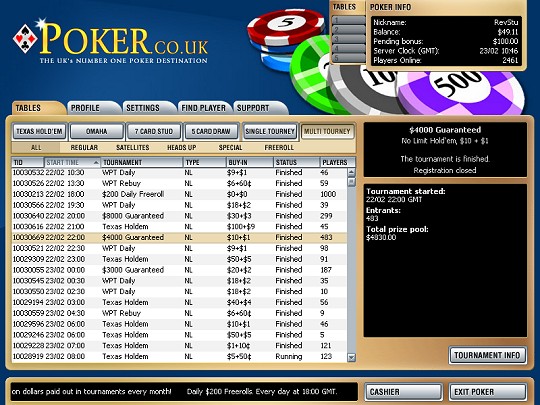
There's a dizzying array of games, rules, stakes and limits.
Even once you've taken the scary leap into the world of cash poker games, there are two significantly different ways to play (quite separate from the dozens of different permutations of poker there are). You can either play on continuous tables (where there's no winner or loser, no start or finish time, and people can join or drop out at any time as long as there's an empty seat), or you can play in tournaments. Tournaments are by far the less risky of the two, since your stake - and hence your potential loss - is a fixed sum. (Unless it's a "buy-in" tournament, but those are the exception and let's not complicate things at this stage.) All players put in the same amount, and the prize pot - minus a "rake" of usually 10% for the casino - is split among the top finishers, with typically something in the region of 30% going to the winner. Everyone starts with the same number of chips, so it's a level playing field.
Continuous games are a lot more frightening. If they're "no-limit" games, which the majority are, you can gamble as much as you want, which also means that players with a lot of money can build up an intimidatingly large stack, putting newcomers at risk of being bullied out of good cards. Lose a hand and there's nothing to stop you just putting another big bunch of chips on your credit card, and next thing you know you're somehow betting £16,000 of REAL MONEY on triple Jacks, only to see a rank outsider fluke an
inside straight on the river and oh my God how am I going to explain this to my wife and kids?
So your semi-intrepid correspondent decided what he was prepared to lose (a bold £20), and went looking for a tournament game. You can usually find a tournament starting on the hour or half-hour at any time of day, and as luck would have it there was an $11 game ($10 to the prize pool, $1 for the house rake) kicking off in 20 minutes, so I signed up. By close of registration there were 227 players, and the top prize was 30% of the pool ($681), with the top 20 all in the money, getting at least twice their stake back.
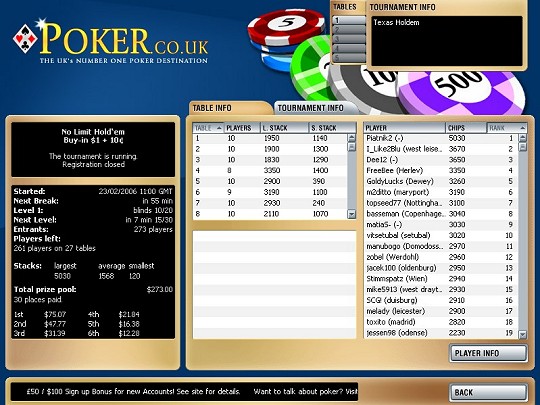
Other poker websites are available. I like
the clear layout of this one.
Now, having heard that a live game with 40 or so players takes about four hours to come to a conclusion, alert viewers with basic arithmetic skills might be a little worried that an online one with six times as many competitors would go on forever. But in fact it's not the case, for a couple of reasons. Firstly, online poker moves much faster. You have a time limit in which to make your move (maybe 30 seconds), after which you'll be automatically folded, so there's none of the extended pondering you get in real life as people weigh up the odds and/or try to suss out their opponents. There's also very little chat or banter in online games. Secondly, there are none of the physical delays - shuffling cards every hand, drawing for deal, moving people from table to table and all that jazz. And thirdly, in an online $11 game with 200 players, the chances are that at least 140 of them are going to be idiots.
One of the most surprising things about playing online is the speed at which you get through players, usually through chumps getting over-excited and going all-in before the flop (that is, betting all the chips in their stack after everyone's been dealt their initial two cards, but before the first three common cards have been dealt to the table). Pre-flop betting is -
very broadly - a somewhat foolish strategy for beginners, since the best hand before the flop will statistically rarely be the best hand after the draw, and is generally only of
much value to experienced players with bad cards trying to bully the "blinds" (the two players who have to bet fixed amounts before each hand) out of their chips.
But this feature isn't trying to be a strategy guide, so we'll move
on.
(For an example of the
speed of online play, in a subsequent game which started off with 201 players the field was reduced to 116 in just 20 minutes, and to 53 after a mere 40 minutes of play. After that, you tend to find your competitors are a lot more persistent.)
So anyway, the game got going, and your reporter was fortunate enough to catch a few decent hands early on. You can keep an eye on the rankings and the number of players left in the game minute-by-minute, and pretty soon I was in the top 10. At this point, technology decided to throw a spanner in the works, just to make things interesting. As I prepared to play another pretty good hand, my table disappeared.
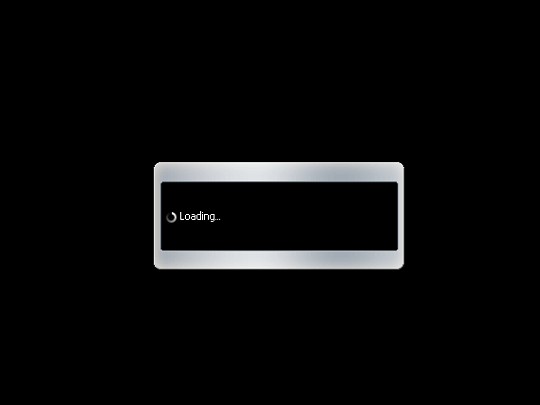
Panic ensues.
For no obvious reason, the game screen first went black with a "Loading..." message, and then disappeared entirely, leaving only the lobby screen visible. I tried in vain to get back to my table, but nothing worked, so I clicked the "Live support chat" tab and spoke to an operator called "Bruno" who essentially appeared to have no idea about anything. I asked if quitting out of the program altogether would forfeit my game, and he didn't know, offering no more constructive advice than to send an email explaining the situation, which didn't sound like it'd be very fruitful. From the lobby screen I could still monitor the game stats, which showed me still in, and there was a five-minute break scheduled in 15 minutes' time. I figured that that represented the most likely opportunity to be able to safely reboot the program, so I sat and nervously watched the stats as the game went on without me, putting in my blinds in turn and reducing my chip stack. Having fallen to 79th place while trying to figure out what the hell was going on, I was pleased to notice that over the next 15 minutes, without playing a hand, I managed to climb back to 61st...
This technical hitch, though, indirectly proved to be one of the more encouraging aspects of the whole online-poker experience. On rebooting the program, the game was able to locate the table and happily resumed as if nothing had happened, which was reassuring. (I later tested it by deliberately exiting the program and reloading it in the middle of a game, which is also coped admirably with, and it also didn't bat an eyelid later in the evening when my hideously unreliable broadband connection flaked out mid-game, requiring the entire PC to be rebooted - it simply kept my chair for me and sat out the hands, putting in blinds if required, until I returned. You're still a bit screwed if you crash when you've just put a big bet in, but there isn't a lot you could reasonably expect the program to do about that - it can hardly keep everyone else waiting while you twat around for an hour with a broken PC. Basically, you get all the protection that could practicably be offered.)
This reporter won't bore you with a blow-by-blow of the surprisingly heart-pounding two hours that followed (one thing you learn quickly when you start playing poker is that hearing about other people's miracle wins or bad beats is only marginally more enthralling than people telling you about their dreams), other than to say that your heroic correspondent saw off the challenge of celebrity pokerist Michael "Beppe out of EastEnders" Greco, who finished a pathetic 16th out of the 227 starters, trailing behind your reporter's own majestic 7th place, which netted a nice little $80 return from the $11 stake. The initial £20 deposit was swiftly withdrawn back onto the Visa card, leaving $70 in profit with which to play a few more tournaments and gather some more valuable experience points. Poker rules!
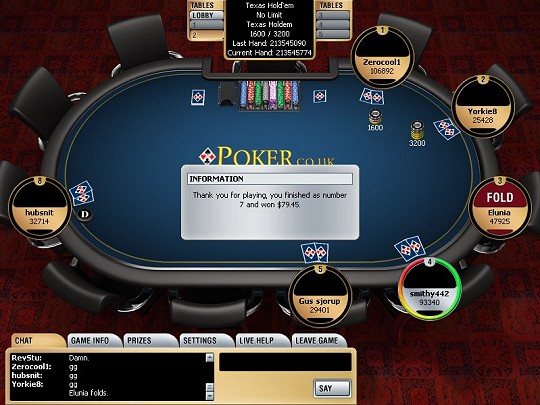
Victory! (To at least some extent.)
So that's how you join in with the global craze for poker, alert viewers of
RSWoP. Firstly, check out
www.poker.co.uk and see if there's a free live game somewhere near you. Playing with real people is a much better way to learn the ropes, you won't lose any money, and at the very least you'll have a fun and cheap night out and get some free goodies. If you can't find a live game, play the online practice tables and freerolls to find out if you like it (and whether you're any good). Again, you won't lose anything, and you might win stuff.
Even cash games, should you be so inclined, offer fairly excellent value for money in terms of entertainment. Tournaments start as low as $1 (about 60p at current exchange rates) and you can easily get two or three hours of play out of one if you don't start throwing piles of chips at terrible hands. Compared to the 70p it costs for a single 10-minute game of pool down at
RSWoP's local boozer these days, that's a pretty good deal.
Some stuff should go without saying, of course. If you know or suspect that you have an addictive sort of personality, for the love of Tiny Baby Jeebus stay away from cash-stakes poker. The substantially-luck nature of the game can make it very hard to walk away from if you get a couple of bad beats (situations where the cards are massively in your favour, then your opponent hits a long-shot draw and gets an improbable winning hand), and while tournaments are pretty safe ground, you could really mess your life up if you take your credit card and your addictive personality into a continuous game. The one absolutely unbreakable rule of playing poker for money is to figure out what your bankroll (the amount you're playing with and are therefore prepared to lose) is, and stick to it NO MATTER WHAT. As long as you follow that one, you'll come to no harm.
Hey, whaddaya know? There IS some fun to be had in online gaming after all!

(Click the banner to play with other RSWoP viewers, and earn
RSWoP referral bonuses.)
|
